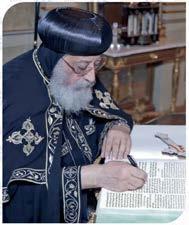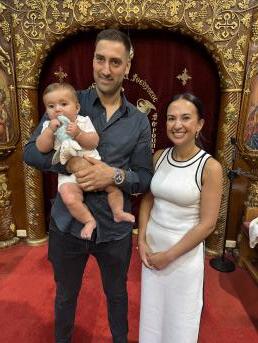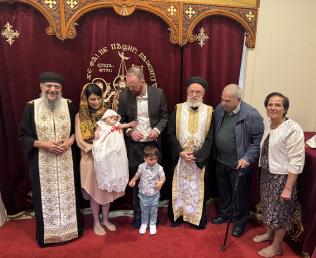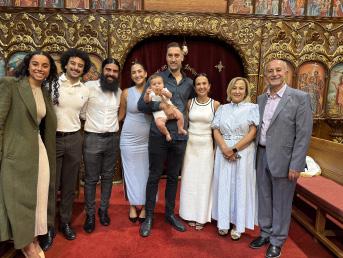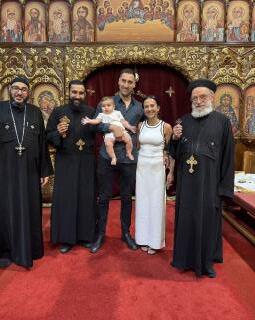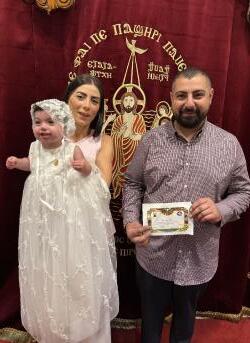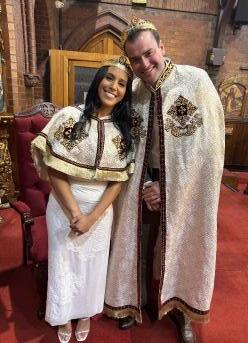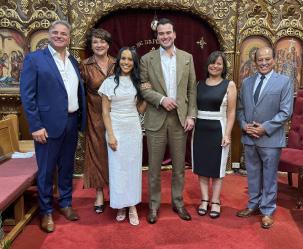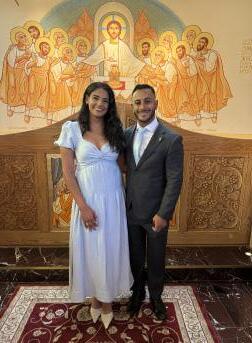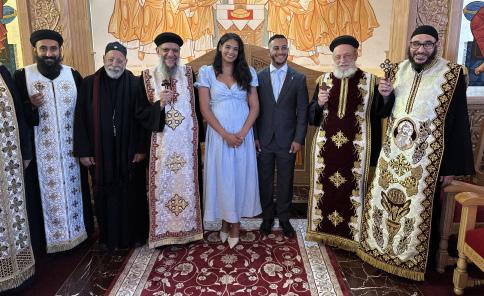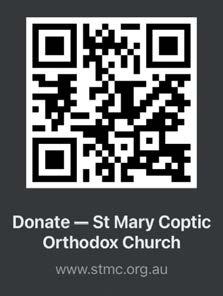
Services at St Mary’s Church
Monday:
Mass 9 - 11 am
Tuesday
Liturgy 5:30 - 7am
7:30pm The Way Orthodox Fellowship in Englisg for adults - All ages
Wednesday: Mass 9 – 11 am
6:30-8pm School of Deacons Adults Thursday
Mass 9 - 11 am - English
English Midnight Praises 7:30pm
English Bible Study 7:30pm
Friday: Mass Mass 9 – 11 am
Youth 25 and above 7-9pm
Discipleship Clas Class 7-8:30pm
Saturday: Mass: 8:30 – 11am
Sunday School 4 – 5.30pm
Vespers & youth meeting 7-8:30pm English
Vespers &Bible Study Arabic 5:30-7pm
Scouts 1:30 - 3pm
School of Deaconsgip 3 - 4pm
Sunday:
1st Mass 6:30 - 8:30 Arabic & English
2nd Mass.8:30 - 10:30 English - St Mary’s Church
3rd Mass 8:30 - 10:30 Arabic - St John’s Chrysostom Church
Family Meeting fortnightly 11:30am Hymns Class - English 11:45 - 12:30pm
Church Priests:
Fr Tadros Sharobeam 0414251251
Email: frtadros@me.com
Fr Habib Girgis Younan: 0401238177 – 94498871
Email: habibgirgisyounan@hotmail.com
Fr Michael Salib: 0422431821
Email: frmichael@sac.edu.au
Church Address: 5 Epsom Rd., Kensington Vic 3031 Tel: 93766651
Fr Kerillos Tawadros 0411 518 399
Fr John Makary 0433 445 636
Additional Liturgies during the Lent: Thursday 5 - 7 pm Fr Michael Tuesday 12- 3pm Fr John
Departure of St. Elizabeth, the Mother of St. John the Baptist.
23rd February - 16th Amsher
On this day the upright and righteous St. Elizabeth, mother of St. John the Baptist, departed. This holy woman was born in Jerusalem to a righteous father called Matthan from the tribe of Levi and from the house of Aaron the priest. Her mother’s name was Sofia. Matthan had three daughters. The first was called Mary, the mother of Salome, the midwife who cared for the Virgin St. Mary during her virginal birth. The name of the second daughter was Sofia, the mother of St. Elizabeth, the mother of St. John the Baptist. The youngest daughter was St. Hannah, the mother of the Virgin St. Mary, the mother of the Savior. Therefore, Salome, Elizabeth and the Virgin St. Mary were cousins. When St. Zacharias the priest married St. Elizabeth, they lived in righteousness and holiness before God, as the evangelist said, “They were both righteous before God, walking in all the commandments and ordinances of the Lord blameless.” (Luke 1:6(
This upright woman was barren. She and her husband continually supplicated God who gave them St. John the Baptist. God was slow in answering their prayers until the time when the Virgin Mary conceived with the Word of God. When they were stricken in age, God sent His angel Gabriel to Zacharias to announce to him, “Your wife Elizabeth will bear you a son, and you shall call his name John,” (Luke 1:13( and the angel told him what would become of St. John. The Virgin St. Mary visited St. Elizabeth to congratulate her on her pregnancy. “And it happened, when Elizabeth heard the greeting of Mary, that the babe leaped in her womb, and Elizabeth was filled with the Holy Spirit.” (Luke 1:41( When she gave birth to St. John, the shame of her barrenness was lifted up from her and her people. When she completed her days in purity, righteousness and chastity, she departed in peace.
Her intercession be with us and Glory be to our God forever. Amen.
The Martyrdom of St. Mina (Menas(, the Monk. (, 24th February - 17th Amsher
On this day St. Mina the monk was martyred. This saint was born in Akhmim to Christian parents who were farmers. Since his youth, his heart was inclined to renounce the world, so he became a monk in one of the monasteries of Akhmim.
For a period of time, he fasted two days at a time and he was ascetic in his food and drink. Then he went to El-Ashmounein and dwelt in a monastery there for 16 years without leaving it.
When the Arabs ruled the country, St. Mina heard that they denied that God had a Son from His nature and essence,
and equal with Him in Eternity. This denial of faith was painful to the saint, so he took permission from the abbot of the monastery and went to El-Ashmounein. He came before the commander of the Arab camp and asked him, “Is it true that you say that God has no Son from His nature and essence?” The commander replied saying, “We deny that saying about God and totally reject it.” The saint told the Arab commander that it should only be rejected if His Son was born through parental procreation, but our belief is that the Lord Christ is God of God, and Light of Light. The commander replied, “In our faith, this is blasphemy.” The saint told him that the Bible says, “He who believes in the Son has everlasting life; and he who does not believe in the Son shall not see life, but the wrath of God abides in him.” (John 3:36( The commander became enraged at this and ordered his soldiers to cut the saint into pieces and to throw him into the sea. The believers gathered the pieces of his body, shrouded and buried it. They arranged a commemoration of St. Mina the monk on this day. His prayers be with us and Glory be to our God forever. Amen.
The Departure of St. Malatius the Confessor, Patriarch of Antioch.
25th February – 18th Amsher
On this day of the year 381 A.D., St. Malatius (Miltius( the Confessor, Patriarch of Antioch, departed. He was ordained a bishop for Sebaste in the year 357 A.D. He left it because of the rudeness of its people and lived a solitary life nearby the city of Halab in Syria. In the year 360 A.D., he was chosen a patriarch for Antioch during the days of Constantius, the son of Constantine the Great. He was an eminent, learned and meek man, who was loved by everyone. When he entered the city of Antioch, he resisted the Arians and kept them away from the churches. When the Emperor heard that, he exiled him in the same year that he was enthroned patriarch. The noble men of the city of Antioch, the bishops and the priests met and wrote to the Emperor asking for the return of the Patriarch. The Emperor returned St. Malatius in shame to them.
When St. Malatius came back in the year 362 A.D., he did not cease resisting the Arians, excommunicating them and all those who believed in their doctrines. He made clear to them their errors and explained to them their blasphemy. He declared, preached and confirmed that the Son was of the same essence as the Father, consubstantial with Him in essence and in Godship. The followers of Arius returned to slander St. Malatius before Emperor Valens, who exiled him again to a country further away than the one to which he was exiled first. When
he arrived to his exile, the bishops and the fathers that were exiled from different countries came and gathered around and stayed with him.
St. Malatius did not slack in teaching and interpreting what was difficult to understand in the Holy Scriptures. His epistles reached his flock, in spite of the distance, confirming their faith in the Holy Trinity, preaching the faith of the Council of Nicea and refuting the teachings of Arius.
He was in exile for many years until his return to Antioch in the year 378 A.D. He was present in the Council of Constantinople in the year 381 A.D. Then he departed in peace.
St. John Chrysostom (Golden Mouthed( praised St. Malatius on his feast day declaring his greatness and that he was not in any less stature than the apostles in honor for what he suffered from exile and humiliation for the sake of the Orthodox faith. His prayers be with us and Glory be to our God forever. Amen.
The Departure of St. Zacharias, Bishop of Sakha. 28th February – 21st Amsher
On this day also St. Zacharias, Bishop of Sakha, departed. He was the son of a scribe called John who left his job and was chosen to be a priest. His son Zacharias was raised on studying literary and religious subjects. When he grew up, El-Wazeer appointed him as a scribe in his court. Afterward he agreed with a friend called Ptolemy who was the prefect of the town of Sakha, to leave their work and go to the wilderness to become monks. That coincided with the coming of a monk from the monastery of St. John the Short, so they decided to go with him to the monastery. When the ruler (El-Wazeer( knew about that, he prevented them from going to the monastery.
A few days later, they saw a vision as if someone was asking them, “Why did you not fulfill your vow?” Immediately, they left in secret, walking to the wilderness, without knowing their way. They met on their way, by the will of God, a monk who took them to the monastery of St. John the Short (Colobos(. When their friends knew about that, they took a letter from the Governor to bring them back, but the Lord defeated their counsel. As for Zacharias and his friend, they put on the garb of the monks and exerted themselves in many worships. That was during the time of the saints Abba Gawargah and Abba Abraham who were the best guides for them. When the Bishop of Sakha departed, the people wrote to the father, the Patriarch, asking for Zacharias to be their bishop. The Patriarch brought him and ordained him against his will. At the time of the ordination, when the Pope was about to put his hands on Zacharias’ head,
a light shined in the church and his face appeared as a bright star.
When he arrived to his diocese, the people rejoiced and went out to meet him with great honor. The church was illumined with his teachings. St. Zacharias was eloquent and filled with grace and he wrote many articles, sermons and discourses. He stayed on his chair for 30 years, then departed in peace. His prayers be with us and Glory be to our God forever. Amen.
The
Martyrdom of St. Onesimus, the Disciple of St. Paul.
On this day also St. Onesimus, the disciple of St. Paul, was martyred. This saint was a slave for a man from Rome called Philemon who believed at the hands of St. Paul, when he heard his preaching in Rome. Philemon departed from Rome on a business trip and took with him Onesimus among others of his servants. There the devil enticed Onesimus, so he stole money from his master and fled to Rome. According to the Divine Will, Onesimus attended the preaching of St. Paul, which he kept in his heart. He believed at the hand of St. Paul and his heart was filled with the grace and the fear of God. He remembered what he stole from his master and from others and since he did not have anything left from the stolen money to return to its rightful owners, he was sorrowful and told St. Paul about that.
St. Paul comforted him and wrote an epistle to Onesimus’ master, Philemon, informing him in it, that Onesimus became a follower of Christ saying, “I appeal to you for my son Onesimus, whom I have begotten while in my chains.” St. Paul asked him to treat him gently and not to mind what he did but to consider what he lost as owed by the apostle.
When Onesimus took the epistle to his master Philemon, he was pleased by his faith and repentance and treated him as the apostle commanded. Furthermore, he offered him more money but St. Onesimus refused saying, “I am rich with Christ.” Then he bid Philemon farewell and returned to Rome.
St. Onesimus continued to serve St. Paul until his martyrdom and deserved to be ordained a priest. After the martyrdom of St. Paul, the governor of Rome seized him and exiled him to one of the islands. He remained there preaching and baptizing the people of the island. When the governor came to the island, he found him guiding the people to the belief in the Lord Christ. He was beaten severely and his legs were broken. He departed in peace.
His prayers be with us. Amen.
Pre Lent Sunday
Matthew 6: 11-18
Therefore, pray: Our Father in heaven (Matthew 6:9( + Our Father who art in heaven
The Lord of Glory, Jesus, gave us this prayer as a living model through which we understand our relationship with God and how precious we are to Him. It is a model from the Lord Himself Who listens to our prayers. That is why the Church cherishes it; it starts and concludes its liturgical prayers, public and private worship . We repeat it so that we live by the Spirit as the Lord wants.
Saint Cyprian said: Let us pray, dear brethren, with what God our teacher has taught us, for it is a beautiful and pleasant prayer. As we ask God with the same words that He used, and we raise to His ears the prayer of Christ Himself. Hence, the father knows the words of His Son when we raise this prayer. Let Him dwell in our voice He who dwells in our chests. We have accepted Him as an intercessor to the Father because of our sins, so we sinners intercede with the same words of the Intercessor. He says, “Whatever you asked of the Father in My name He gives you, how much more if we asked Him in the name of Christ and the same prayer He prayed.
+ Hallowed be thy Name
God, in His love for mankind, wants him to be a son for Him. He lives bearing His image and walking on His example, attracted to Him so that he lives with him in his embrace. This concept was lost by man through sin as he was not able in the Old Testament to raise his eyes to talk to Him as a son with his Father. The problem that grieves God’s heart reprimanded him, saying, “I raised sons and brought them up but they disobeyed me” (Is 1: 2(. “I said you (. are gods and the children of the Most High are all of you” (Psalm 82: 6(. “If I am a Father, then where is ( my honour?” (Malachi 1: 6((. ((. Saint John Chrysostom believes that this prayer was in fact offered in the name of the whole congregation. Even He offered it in the name of the whole church.
+ Thy Kingdom come +++
The kingdom of God is the goal of our faith. We desire to see Him coming on the clouds, welcoming His holy bride face to face, to enter with her into the Eternal Wedding. This kingdom is an extension and announcement of the truly coming kingdom in the holy church on earth where our Lord Jesus reigns
over the heart and proclaims His glories inside him. Hence, what the children of the kingdom enjoy on the last day is not strange to them, just as what the children of darkness suffer is an extension of what they have been doing here. Therefore, the prayer here only belong to us (the kingdom of God(, where we ask our God to reveal his splendour in us by His Holy Spirit, in the only begotten Son, hence, we obtain the kingdom. Rather, we will become His Kingdom. Father Isaac says: Christ reigns day by day in the saints. This results in the expulsion of Satan’s authority from our hearts and the annihilation of the filth of sin. Hence, God begins to rule over us through the sweetness of virtues. Adultery will be defeated and virtue will control over our hearts, calmness will rule while anger will recede. And humility crushes pride underfoot.
Saint John Chrysostom says: it is the language of the son who has a righteous mind that is not attracted to visible things nor counts the present things as great things. Rather he speeds towards our Father, longing for the things to come (the eternal kingdom(. This originates from a good (. conscience and a soul free from earthly things; this is what St. Paul longs for, every day when he says: we also who have the first fruits of the Spirit, even we ourselves groan within ourselves, eagerly waiting for the adoption, the redemption of our body (Rom.8: 23(. He who has these de- . de sires cannot love the present goodness and is not confused by the sorrows of this life. Rather, he is liberated from all the impurities, as if he is in the heavens.
+ Thy will be done on earth as it is in Heaven +++
If a believer walks with his body on the earth, but does not see on the earth an obstacle to his enjoyment of the divine and heavenly kingdom, then he is living here for the account of this kingdom with a heart high for the heavenly things. By this he asks his heavenly Father to fulfil His will in him while he is on earth as he does it in the heaven. The Lord teaches us to say “let your will be done as in heaven, so also on earth” He is not teaching “as by heaven, so by earth” because neither the heavenly nor the earthly can fulfil their will without Him. They need his grace to fulfil his will in them.
+ Our daily bread +++
Saint John Chrysostom sees that after praying for heavenly matters in the previous requests, he asks us to ask Him even about our carnal needs and the necessities of life due to the weakness of our nature. Therefore, we ask for our daily bread. That is, only one day bread, and we do not ask for tomorrow.
+ And do not lead us into temptation, but deliver us from the evil one.. ++
Here the believer asks the Lord not to fall under the weight of temptation through his human weakness. On the other hand, he asks Him to deliver him from the evil enemy; that is Satan. Indeed, the believer knows the abilities of God his Father that works in him to conquer and be victorious in Christ Jesus against sin and Satan, but he does not rush towards temptation or wishes it, but in humility he asks (the Lord( ( to support him internally lest he collapses, and supports him from the outside, so he saves him from the evil devil God does not want the haughty soul that is reckless and does not guard against temptation. Rather, He wants a humble soul, so that its victory in God will be more glorious and Satan’s defeat is more certain
Job was tempted, but he did not enter into temptation, as he did not utter any blasphemy against God nor did he surrender to an evil mouth like the desire of the evil one himself.
Abraham was tempted, Joseph tempted, but neither of them entered into temptation because they did not surrender to satisfy the tempter.
St. Cyprian says: When we say “Deliver us from the evil one”, nothing remains to be desired, as we ask God to protect us from the evil, and he gives us. Hence, we stand in safety and peace against everything that the devil or the world does against us because nothing can terrify in this life if God was his keeper.
+ For Yours is the kingdom and the power and the glory forever. Amen. +++
This Doxology, which is the final praise of the Lord’s Prayer, the believer sings with joy declaring that God has eternal power, power and glory. This Doxology must be accompanied by a work so that the believer declares the kingdom, power and glory of God through his behaviour that is in harmony with this doxology. As if he is saying with the psalmist
‘the rivers to clap their hands’. (Psalm 98: 9(. (. Saints are like rivers clapping praises by the mouth, and also from the hands, that is, during their practical life. With our saying ‘To You is the kingdom with our tongues we offer our heart so that He may reign completely over it and nothing else. And with our saying ‘to You is the power’ we accept the fiery work of the Holy Spirit, which is strongly proclaimed during our continuous sanctification. And with ‘to You is the glory’ the Spirit takes us into union with God in his Son to seek the glories of sonship, realizing his eternal and glorious inheritance.
Saint John Chrysostom comments on this eternal phrase or doxology by ‘if your weaknesses were many, you trust that He has the power to sanctify you easily. He does not only free you from the dangers that approach you, but is able to make you glorified and blessed.
The Church used to conclude this divine prayer before the doxology that is in our hands by saying ‘through Christ Jesus our Lord’, as if it were saying with Saint Jerome: look from above to us, and You will see Your Son dwelling in us, we pray to you through Your Son; the object of your pleasure’.
The Lord concludes his sermon about prayer by saying ‘for if you forgive men their trespasses, your heavenly Father will also forgive you. But if you do not forgive men their trespasses, neither will your Father forgive your trespasses (Matthew 6: 14-15(. After pre- . pre senting the Lord’s Prayer, the Lord chose this phrase alone from the prayer, stressing that forgiveness for the sins of others directed against us is the key to answering to all requests in the Lord’s Prayer. For God opens his embrace to all and desires to give free but does not listen to a heart closed to his brother. The Lord will not forgive to the one who does not forgive. Saint Augustine says ‘Let us take into account the concern of Christ with the request for forgiveness of sins for others, above all other requests. He wants us to be merciful so that we flee from misery by forgiving our sins. . With this doxology alone, we enter into a covenant with God.

